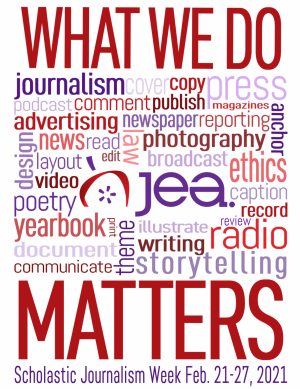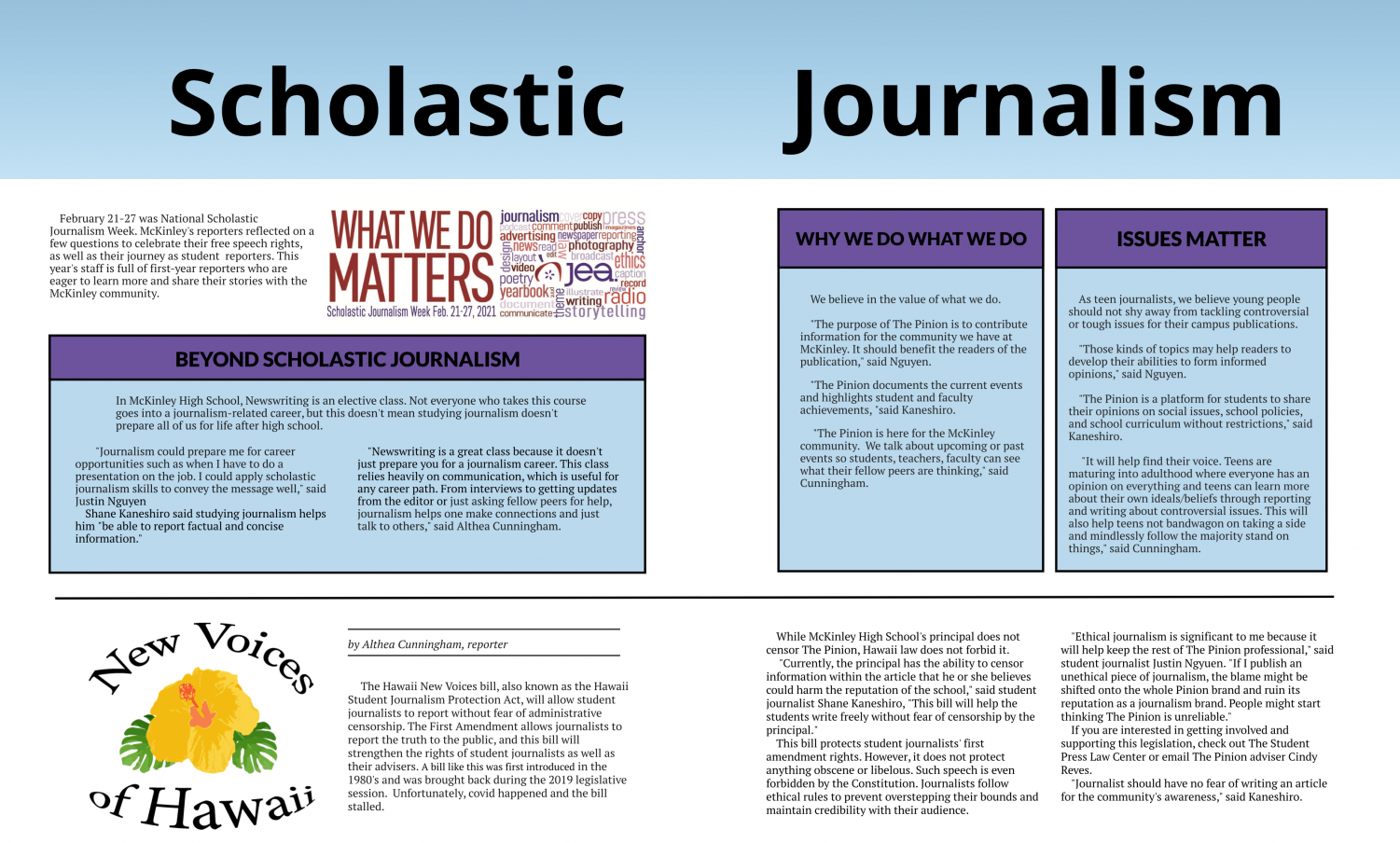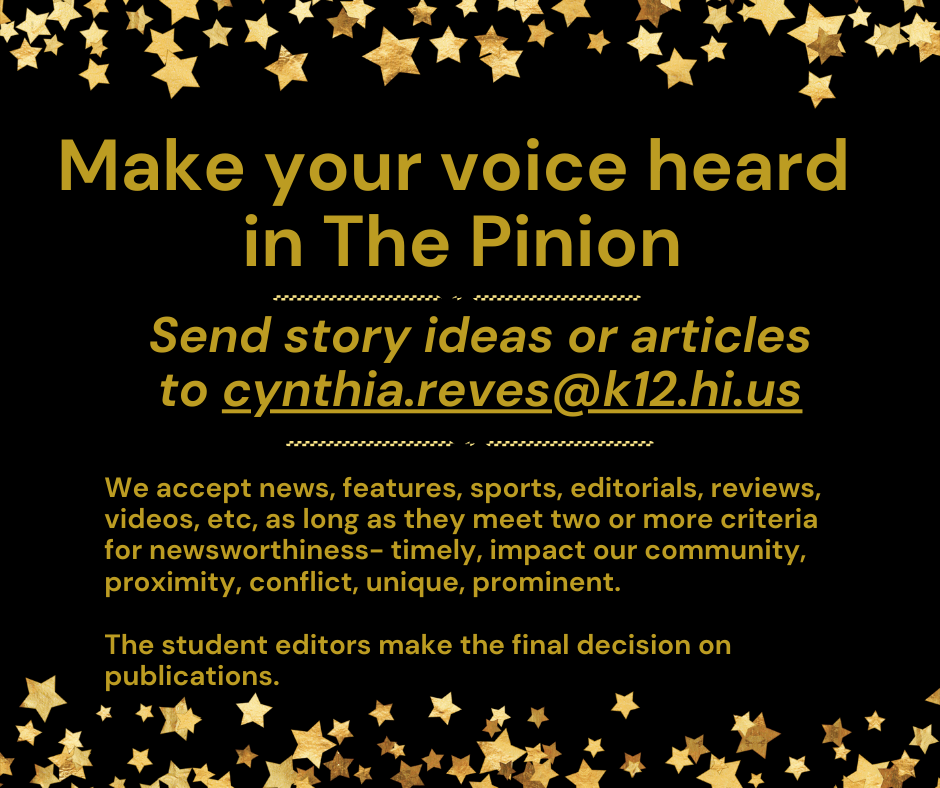Scholastic Journalism Week 2021
March 10, 2021
 February 21-27 was National Scholastic Journalism Week. McKinley’s reporters reflected on a few questions to celebrate their free speech rights, as well as their journey as student reporters. This year’s staff is full of first-year reporters who are eager to learn more and share their stories with the McKinley community.
February 21-27 was National Scholastic Journalism Week. McKinley’s reporters reflected on a few questions to celebrate their free speech rights, as well as their journey as student reporters. This year’s staff is full of first-year reporters who are eager to learn more and share their stories with the McKinley community.
Beyond Scholastic Journalism
In McKinley, Newswriting is an elective class. Not everyone who takes this course goes into a journalism-related career, but this doesn’t mean studying journalism doesn’t prepare all of us for life after high school.
“Journalism could prepare me for career opportunities such as when I have to do a presentation on the job. I could apply scholastic journalism skills to convey the message well,” said Justin Nguyen.
“Journalism could prepare me for career opportunities such as when I have to do a presentation on the job. I could apply scholastic journalism skills to convey the message well,” said Justin Nguyen “Journalism sparks one’s passion for writing. Writing articles could inspire readers to create, do, or even believe what the article is about,” said Shane Kaneshiro.
“Journalism could prepare me for career opportunities such as when I have to do a presentation on the job. I could apply scholastic journalism skills to convey the message well,” said Justin Nguyen “Journalism sparks one’s passion for writing. Writing articles could inspire readers to create, do, or even believe what the article is about,” said Shane Kaneshiro. “Newswriting is a great class because it doesn’t just prepare you for a journalism career. This class relies heavily on communication, which is useful for any career path. From interviews to getting updates from the editor or just asking fellow peers for help, journalism helps one make connections and just talk to others,” said Althea Cunningham.
Why we do what we do
We believe in the value of what we do.
“The purpose of the Pinion is to contribute information for the community we have at McKinley. It should benefit the readers of the publication,” said Nguyen.
“The purpose of the publication is to show what the community of McKinley has completed or shown,” said Kaneshiro.
“The Pinion is here for the McKinley community. We talk about upcoming or past events so students, teachers, faculty can see what their fellow peers are thinking,” said Cunningham.
Issues Matter
As teen journalists, we believe young people should not shy away from tackling controversial or tough issues for their campus publications. “Those kinds of topics may help them to develop their abilities to form informed opinions,” said Nguyen. “They could write better articles and since will help with their writing in the future,” said Kaneshiro. “It will help find their voice. Teens are maturing into adulthood where everyone has an opinion on everything and teens can learn more about their own ideals/beliefs through reporting and writing about controversial issues. This will also help teens not bandwagon on taking a side and mindlessly follow the majority stand on things,” said Cunningham.
Hawaii New Voices
The Hawaii New Voices bill, also known as the Hawaii Student Journalism Protection Act, will allow student journalists to report without fear of administrative censorship. The First Amendment allows journalists to report the truth to the public, and this bill will strengthen the rights of student journalists as well as their advisers. A bill like this was first introduced in the 1980’s and was brought back during the 2019 legislative session. Unfortunately, covid happened and the bill stalled.
While McKinley High School’s principal does not censor The Pinion, Hawaii law does not forbid it.
“Currently, the principal has the ability to censor information within the article that he or she believes could harm the reputation of the school,” said student journalist Shane Kaneshiro, “This bill will help the students write freely without fear of censorship by the principal.”
This bill protects student journalists’ first amendment rights. However, it does not protect any obscene, or libelous. Such speech is even forbidden by the Constitution. Journalists follow ethical rules to prevent overstepping their bounds and maintain credibility with their audience.
“Ethical journalism is significant to me because it will help keep the rest of The Pinion professional,” said student journalist Justin Ngyuen. “If I publish an unethical piece of journalism, the blame might be shifted onto the whole Pinion brand and ruin its reputation as a journalism brand. People might start thinking The Pinion is unreliable.”
If you are interested in getting involved and supporting this legislation, check out The Student Press Law Center or email The Pinion adviser Cindy Reves.
“Journalists should have no fear of writing an article for the community’s awareness,” said Kaneshiro.
*Update: In May 2022, Hawaii’s Governor David Ige signed the Hawaii Student Journalism Protection Act into law.






